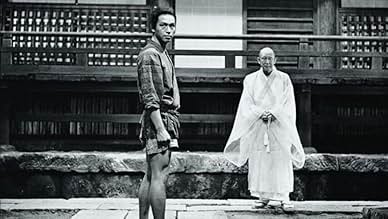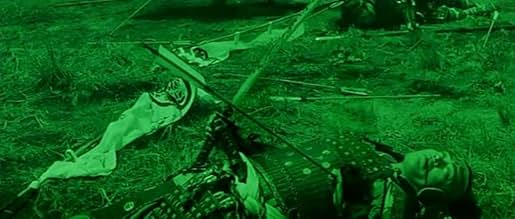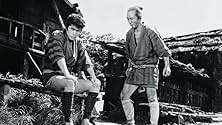Aggiungi una trama nella tua linguaA young man decides to become a warrior, causing trouble for his clan.A young man decides to become a warrior, causing trouble for his clan.A young man decides to become a warrior, causing trouble for his clan.
- Regia
- Sceneggiatura
- Star
- Premi
- 1 vittoria in totale
Kôshirô Matsumoto
- Sozo, 1st son
- (as Somegoro Ichikawa)
Kichiemon Nakamura
- Yasuzo, 2nd son
- (as Mannosuke Nakamura)
Recensioni in evidenza
This is the saga of a family of farmers, some of whom become distinguished soldiers and even generals. It begins the evening when one of their numbers comes home, having captured an enemy general, earning great praise. That night, his nephew is born, as is the son of the local daimyo. We don't follow the nobleman, but the farmer, as he grows up, is persuaded not to run off to war by getting him a wife, has sons and daughter, and.... well, 'persists' is the best word I can think of, while other men in his family go to war and die, while the women move to town, and go mad, while the river Fuefuki flows outside the house that everyone refers to as an 'insect trap.'
Keisuke Kinoshita's movie is an epic, but it breaks the rules, by being an anti-war epic. It's shot in wide screen, with an aspect ratio of 2.35:1, but it's not shot in color, color is shot through it, in tints and tones and what looks like Handschlegel effects, and gels that color part of the screen like airbrushed clouds. This is the war of the samurai class, so these splashes of color suggest old scrolls. However, that's during battles, and the aftermath. When it's just the peasants, and no one is dying, it's all black and white. Back when this was made, black & white was the film of reality. Color was for fantasy, or perhaps madness. Over all, it's saying "We could do this sort of movie straight and make the Big Bucks. That's not we want to do."
There's quite a cast, and Kinoshita and his regular cameraman, Hiroshi Kusuda, know how to fill that wide, wide screen. The samurai sequences are shot as well as anything that Kurosawa did, but his sequences lack Kurosawa's bravado.... and his humor. Kurosawa's samurai might be stupid, but they are always noble. There are no crippled mothers in Kurosawa, so far as I can recall, hobbling along as fast as a mounted army, begging her sons to come home. There are no samurai killing themselves so they won't suffer the agonies of burning to death, while priests sit calmly. There are no silk merchants burned to death because they dare to be rich in Kurosawa's films.... although perhaps he and his collaborators might write it so they deserve to die for other things. Because they are not samurai, they are merchants, and so they are evil.
Well, Kurosawa's family was a samurai family. I have no idea about Kinoshita's family. In 2019, this looks like going well overboard to make a point. Given the popularity of samurai movies when it was made, I'm not sure.
Keisuke Kinoshita's movie is an epic, but it breaks the rules, by being an anti-war epic. It's shot in wide screen, with an aspect ratio of 2.35:1, but it's not shot in color, color is shot through it, in tints and tones and what looks like Handschlegel effects, and gels that color part of the screen like airbrushed clouds. This is the war of the samurai class, so these splashes of color suggest old scrolls. However, that's during battles, and the aftermath. When it's just the peasants, and no one is dying, it's all black and white. Back when this was made, black & white was the film of reality. Color was for fantasy, or perhaps madness. Over all, it's saying "We could do this sort of movie straight and make the Big Bucks. That's not we want to do."
There's quite a cast, and Kinoshita and his regular cameraman, Hiroshi Kusuda, know how to fill that wide, wide screen. The samurai sequences are shot as well as anything that Kurosawa did, but his sequences lack Kurosawa's bravado.... and his humor. Kurosawa's samurai might be stupid, but they are always noble. There are no crippled mothers in Kurosawa, so far as I can recall, hobbling along as fast as a mounted army, begging her sons to come home. There are no samurai killing themselves so they won't suffer the agonies of burning to death, while priests sit calmly. There are no silk merchants burned to death because they dare to be rich in Kurosawa's films.... although perhaps he and his collaborators might write it so they deserve to die for other things. Because they are not samurai, they are merchants, and so they are evil.
Well, Kurosawa's family was a samurai family. I have no idea about Kinoshita's family. In 2019, this looks like going well overboard to make a point. Given the popularity of samurai movies when it was made, I'm not sure.
There's a rare sense of epic artistry in this unusual and striking medieval saga, directed by Keisuke Kinoshita as more of an aesthetic experience than a conventional drama. The film was designed to resemble a decorative 16th century Japanese scroll, painting spare brushstrokes of vivid color across each panoramic, wide-screen black and white image. It can be difficult (and not really worth the effort) to follow the endless progression of characters, and the manner in which the film unfolds is often more involving than the story it presents. Each leap forward in time approximates the turning of another page, usually to the next in a series of pointless, bloody battles between feudal warlords, with each conflict properly labeled beforehand, identifying the date, location, and principals involved. The battle scenes serve as punctuation, following successive generations of peasant soldiers to their doom, with the repetition suggesting that war is the only eternal aspect of the human condition, and passive resistance is futile.
Rating - 4/10
The enigmatic title is explained near the end, which more or less paraphrases "Ol' Man River" - he just keeps rollin' along, regardless of the follies of man. The films set in the "turbulent century", and was it ever ! The film's two hours covers about 70 years, and there's a battle nearly every five minutes. The large cast of characters, principally of one small family, deal with the age-old problem of the young getting carried away with war and the older warning them how futile it all is. There are a number of deaths which coincide closely with births, and the characters assume they therefore know where the souls have reincarnated.
The war-is-futile message is hammered home without subtlety and, despite the downtrodden gaining occasional triumphs, it's all very depressing. The only character who has a good laugh is killed shortly afterwards, and partly for that reason !
The strange aspect of this film is that it is part-colourized. In many frames, these are simply large splashes of colour laid-over, and they look terrible and amateurish. Other frames have more minute and detailed colorization, which is quite pleasant. But the film would have looked better if it had stuck to B&W only.
The four points I've awarded this film are mainly for the acting, which is good to great throughout. The oval-faced beauty Hideko Takamine is very watchable for the first half at least, but has far less to do than some of her other roles. The actress (name unknown) who plays the pretend-madwoman Tatsu is a standout.
But it takes more than good acting to make a good pic. I cannot recommend this pic.
The enigmatic title is explained near the end, which more or less paraphrases "Ol' Man River" - he just keeps rollin' along, regardless of the follies of man. The films set in the "turbulent century", and was it ever ! The film's two hours covers about 70 years, and there's a battle nearly every five minutes. The large cast of characters, principally of one small family, deal with the age-old problem of the young getting carried away with war and the older warning them how futile it all is. There are a number of deaths which coincide closely with births, and the characters assume they therefore know where the souls have reincarnated.
The war-is-futile message is hammered home without subtlety and, despite the downtrodden gaining occasional triumphs, it's all very depressing. The only character who has a good laugh is killed shortly afterwards, and partly for that reason !
The strange aspect of this film is that it is part-colourized. In many frames, these are simply large splashes of colour laid-over, and they look terrible and amateurish. Other frames have more minute and detailed colorization, which is quite pleasant. But the film would have looked better if it had stuck to B&W only.
The four points I've awarded this film are mainly for the acting, which is good to great throughout. The oval-faced beauty Hideko Takamine is very watchable for the first half at least, but has far less to do than some of her other roles. The actress (name unknown) who plays the pretend-madwoman Tatsu is a standout.
But it takes more than good acting to make a good pic. I cannot recommend this pic.
I'm not one to usually comment on movies on IMDb, but I think the fact that the only review that shows up on the site says "Depressing" and gives it a low mark, I had to resolve that issue.
This movie is absolutely amazing. Firstly, the scope of the story is really quite amazing. We basically have six generations of one family, and their story. The story itself isn't really complex, but it really does linger in your mind for a while after watching the movie. The basic story is the how futile fighting can be. The acting is top notch, there isn't a bad performance in the lot. I thought the color effects were a little weird, and I'm not sure I understood the point of them. It didn't take away from the movie at all though.
This is an amazing film. Is it sad? Yes, it is, but that doesn't mean it shouldn't be watched. This is really a hidden gem of Japanese cinema, and I'd love to see it get a US release at some point.
This movie is absolutely amazing. Firstly, the scope of the story is really quite amazing. We basically have six generations of one family, and their story. The story itself isn't really complex, but it really does linger in your mind for a while after watching the movie. The basic story is the how futile fighting can be. The acting is top notch, there isn't a bad performance in the lot. I thought the color effects were a little weird, and I'm not sure I understood the point of them. It didn't take away from the movie at all though.
This is an amazing film. Is it sad? Yes, it is, but that doesn't mean it shouldn't be watched. This is really a hidden gem of Japanese cinema, and I'd love to see it get a US release at some point.
I would really love to see again this film, which I've seen in São Paulo in 1961. Besides the positive aspects mentioned by the reviews already posted, I would emphasize another quality: some events are presented two or three times from the point of view of the different characters. As the events are not organized in chronological order, and the situations, faces and happenings are similar, the film seems absolutely confusing, till you realize what is intended to be shown: the reality is repetitive, but unique for each person, and each event must be understood from different angles. It's a pity that this film is not available on DVD.
Lo sapevi?
- QuizFinal film of Kuniko Igawa.
I più visti
Accedi per valutare e creare un elenco di titoli salvati per ottenere consigli personalizzati
Dettagli
- Tempo di esecuzione1 ora 57 minuti
- Colore
- Mix di suoni
- Proporzioni
- 2.35 : 1
Contribuisci a questa pagina
Suggerisci una modifica o aggiungi i contenuti mancanti

Divario superiore
By what name was Fuefukigawa (1960) officially released in Canada in English?
Rispondi





























